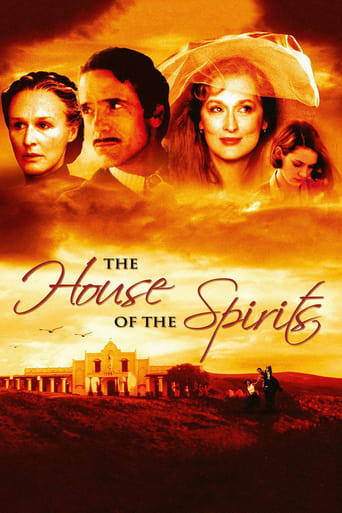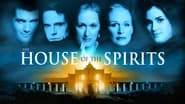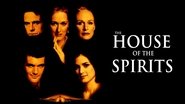clynn05
This was a silly movie - the mother had to be at least 10 years younger than the father, and yet they had her age so much quicker and die first ??The main character was a horrible man - and yet the mother says to the daughter, about the father, 'it isn't malice'... What !? He is nothing but malicious. The character was never shown to do one good thing.There is no romanticism here... masochism maybe... He was a horrible man and I could see no reason why Clara would have loved him.There was no point to this movie, unless it is to encourage women to punish themselves by loving evil men.Watching this was a big waste of my time.
Note Two
I first watched this movie at a theater in Cairo, Egypt around October or November 1996. Although released in 1993, it is still relevant to this day, which is only possible because it indeed is a rare masterpiece. For those who have not gone through the perils of evil politics and foreign intervention in their countries, it might be difficult for them to grasp the many meanings this movie delivers. They simply cannot relate unless they try to put themselves in the place of the movie's characters and what they were going through.There aren't enough words that can describe the pain a person can feel when his and his countrymen's freedom and personal liberties are taken away as a result of the unjust foreign policy of a another country and in the case of this movie, with the collaboration of some of his own arrogant countrymen.The story, The House of the Spirits, written by Isabelle Allende, who is a relative of the democratically elected President of Chile Salvador Allende who was deposed of - with foreign intervention - by the country's powerful General Augusto Pinochet, covers the turmoil Chile went through during that period of time - before the coup and after (without actually mentioning the real names of the players - instead she uses fictitious names). With the exception of only a few fairy-tale like scenes involving talented veteran actress Meryl Streep's telepathic supernatural character (and a few unnecessary love scenes), the movie was extremely well executed. Rarely does a movie combine such a solid team of actors and actresses as did this movie, Jeremey Irons, Winona Ryder, Antonio Banderas, Meryl Streep, Maria Alonso, Sarita Choudhury, Glenn Close, Joaquín Martínez, Grace Gummer, Armin Mueller-Stahl, Vincent Gallo, Miriam Colon and Hannah Taylor Gordon combined together did a great job telling this rarely told story genre. It's a must see for everyone wishing to enjoy excellent acting, a real story, and for those interested in politics, democracy and the transformation to complete military authoritarianism (far from boring as these topics might appear to some, the movie is very exciting), definitely a must see. It will hopefully demonstrate to you the horrendous effects of a foreign policy that doesn't place justice and fairness at the forefront of its priorities. I hope you enjoy it. :)
jabse
This film is an interesting adaptation of Isabel Allende's best seller by the same name. An interesting story, beautiful landscapes, well developed drama and characters delivered by a great cast. Jeremy Irons excels as Esteban Truebas, the tough and contradictory landowner, and Merryl Streep is a wonderful Clara, light, breezy, spiritual, as the character in the novel. Excellent performance of Glenn Close as well as the sacrificed spinster who cares for her mother while her brother is busy trying to achieve his ambitions. Barely good but certainly not outstanding is Antonio Banderas as Pedro, with excessive "hard handsome macho revolutionary looks" at times. Less fortunate acting by Wynona Ryder, who spoils the character with her overly adolescent posture. The film compacts three generations into two, understandably for the development of characters in a movie. A couple of failed aspects, however. First, the complex Chilean political situation at the time is simplified almost to a family affair, something the book does not pretend to do. The malice of the military establishment seems random, devoid of planning and intelligence, but whoever knows the Chilean history (and his ferocious but cunning leader) is aware it wasn't at all like that. And second, the most important miss in the movie: lack of humor. Precisely the brilliant achievement of Isabel Allende's novel is telling a highly dramatic story with a delightful and ironic humor throughout. Yet the movie moves from one drama into another, with just a few moments of respite (therefore becoming "heavy" and at times hard to swallow), and has practically no humor other than a few scenes at the beginning. A pity, because with such a story and the excellent delivery by the cast it could have been a truly great film.
CalvinValjean
The first time I saw THE HOUSE OF THE SPIRITS, I had a similar reaction to what most critics seemed to have. I felt the movie was bad, but couldn't say why exactly. It's hard to find fault in a movie with such an esteemed cast, such great sets and cinematography, etc. I knew it was based on a famous novel, so I figured the problem must have been in the adaptation.Upon reading the novel and then going back to the film, I realized something interesting: the film starts out as a faithful adaptation before losing its way, but the biggest issue is the tone.The novel's style of magical realism is, right from the start, difficult to adapt to film. There's green hair, there's magic remedies, and there's a very darkly humorous tone. The film on the other hand is very bleak and brooding, with only some slight supernatural element, which is kind of shrugged off. Roger Ebert, who always has a perfect way of articulating the best criticism, worded it best: "Magic realism, which informs so many South American stories, is treated here as a slightly embarrassing social gaffe, like passing wind. Clara's gifts are not made integral to the story; the filmmakers see them more as ornamentation." For example, in the book, Severo and Nivea die in a car accident and Clara keeps her mother's decapitated head in the basement. Years later, when Clara dies, Esteban tells his servants "Well, we might as well bury my mother-in-law's head now." Moments like that are missing, and instead we just have a scene of Severo and Nivea in a random car accident in the film, and are then never mentioned again. Why even bother having the car accident at all? And why waste Vanessa Redgrave in such a small role? Now this leads into another issue: the most infamous criticism of this film is that it stars a bunch of "gringos" (Jeremy Irons, Meryl Streep, Glenn Close, and Winona Ryder) as Chilean characters. At first glance, you might think this is a shallow thing to criticize: actors play characters of different ethnic backgrounds all the time, nor is there any one way that a Chilean person should "look." But I think this criticism is actually a misdiagnosis of a bigger problem. The problem isn't that these actors are all Anglo; it's the fact that they play their characters in a very Anglicized way for an Anglo audience. They mispronounce names like Tres Marias ("Trays Muh-ree-ahs") and Esteban ("Estuh-baan") and say them all as if these names are foreign to them. Irons, who is British, sounds American while Close, who is American, sounds British. Winona Ryder's character is presented as an all-American girl. There's even a scene towards the end, while Blanca is being tortured and Alba waits for her at home, where Alba is eating out a Kentucky Fried Chicken box in the 1970's! (KFC didn't start opening stores in Chile until 1992. Yes, I actually looked it up out of curiosity). Now you might say "Who cares if they show a KFC box? That's nitpicking." It might not seem important, but on a subtextual level, it's significant. The filmmakers are trying to dilute the Hispanism of the story and create the mindset that this could easily be happening in the US. All of this adds a feeling of displacement to the movie. Because it loses its Chilean and Latino identity, the politics lose their context. What is the coup at the end all about? Why does it happen? What happened to the workers at Tres Marias? Why was Pedro III an enemy of the military's?When you take this story, remove its Hispanic context and magic realism, what you're left with is just a domestic drama, which is less interesting than its book counterpart when it is simplified. The adaptation's biggest change is the removal of an entire generation and combining Blanca and Alba into one character. This completely changes the third act and it now makes no sense for Esteban to help Pedro III escape. In the book, Esteban joins forces with Miguel as they both care about saving Alba. In the film's version, joining forces with Pedro III will in no way have any affect on saving Blanca. The impact of Esteban's relationship with Alba is also lost as she is reduced to only a small child in the film and not given much character. In the book, Esteban has affairs with multiple women at Tres Marias and fathers many children, which everyone is aware of. In the film, he just randomly commits violent rape one day in a very abrupt scene, and then completely forgets about it until a son shows up one day. Because of the removal of an entire generation, Esteban III in the book is Esteban II in the film, and his character is given the Hollywood archetypes of a perverse and disturbed villain rather than as the symbol of lineage of violence he was in the book. In addition to this you have the removal of Blanca's brothers from the book and a climax that doesn't play very dramatically, and the resulting story is very fractured and loses the epic 3-generation sweep of the novel.I am left wondering if any film could have been made of this book, which has so many characters and spans many different episodes. Regardless, this film, and its serious tone, do not suit the book at all, and just leaves audiences wondering what the story they just saw was all about.







